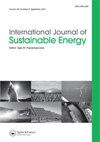印度的经济增长和部门层面的电力消耗关系:来自协整和频域因果关系方法的新证据
IF 2.7
Q4 ENERGY & FUELS
引用次数: 3
摘要
摘要:印度等发展中经济体的增长路径和部门进展不断演变,因此有必要重新评估其能源与经济关系。这一部门层面的审查旨在为印度经济增长对电力部门的依赖找到新的证据。利用1971年至2019年人均实际GDP和部门级电力消耗的年度数据,采用联合协整检验和频域因果关系方法。估计结果显示,农业部门的电力消耗对增长产生了负面影响,而工业和服务业都提高了生产。此外,频域因果关系方法的结果支持印度研究期间的增长假说,因为至少在短期到中期的频率中发现了三个部门与经济增长的单向因果关系。电力消费促进增长作用的可持续性将取决于更多针对具体部门的能源政策和能源基础设施发展的公共支出,而不是平淡的补贴。本文章由计算机程序翻译,如有差异,请以英文原文为准。
Economic growth and sectoral level electricity consumption nexus in India: new evidence from combined cointegration and frequency domain causality approaches
ABSTRACT The re-assessment of energy – economy nexus in developing economies like India is necessitated by the constant evolution of their growth path and sectoral progression. This sectoral level examination is intended to find new evidence for the dependence of economic growth on the electricity sector in India. Using annual data of per capita real GDP and sectoral level consumption of electricity from 1971 to 2019, the combined co-integration test and Frequency domain causality approaches are employed. The estimated results show the negative impact of agricultural sector electricity consumption on growth, whereas both the Industrial and service sector enhances the production. In addition, the results of the Frequency domain causality approach support the Growth hypothesis for the study period in India, as Uni-directional causality from three sectors to economic growth were found at least in a frequency of short run to medium run. The sustainability of the growth-enhancing role of electricity consumption will depend on more sector-specific energy policies and public spending on energy infrastructure development than bland subsidies.
求助全文
通过发布文献求助,成功后即可免费获取论文全文。
去求助
来源期刊

International Journal of Sustainable Energy
ENERGY & FUELS-
CiteScore
5.70
自引率
3.20%
发文量
52
期刊介绍:
Engineering and sustainable development are intrinsically linked. All capital plant and every consumable product depends on an engineering input through design, manufacture and operation, if not for the product itself then for the equipment required to process and transport the raw materials and the final product. Many aspects of sustainable development depend directly on appropriate and timely actions by engineers. Engineering is an extended process of analysis, synthesis, evaluation and execution and, therefore, it is argued that engineers must be involved from the outset of any proposal to develop sustainable solutions. Engineering embraces many disciplines and truly sustainable solutions are usually inter-disciplinary in nature.
 求助内容:
求助内容: 应助结果提醒方式:
应助结果提醒方式:


